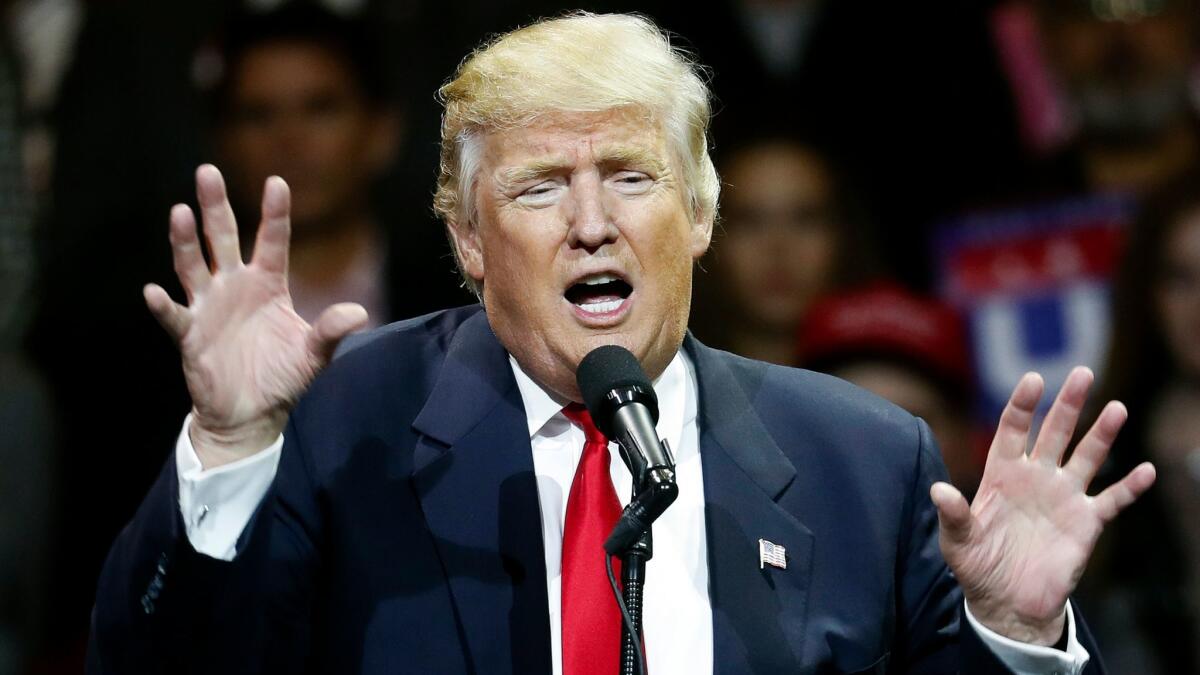Column: Take Trump seriously but not literally? How, exactly?

It would make a perfect clickbait ad “Learn this one simple trick to stop worrying about Donald Trump and Make America Great Again.”
What’s the trick? All you have to do is take Trump seriously, but not literally.
The formulation is credited to reporter Selena Zito who, in an article for the Atlantic last September, noted that the news media takes Trump’s more outlandish statements literally but not seriously, while his supporters do the inverse.
Even the president-elect’s team has declared this a kind of Rosetta Stone for deciphering Trumpspeak.
Corey Lewandowski, Trump’s first campaign manager, recently explained at a post-election conference at Harvard, “This is the problem with the media. You guys took everything Donald Trump said so literally. And the problem with that is the American people didn’t.”
Peter Thiel, a major Trump backer, made the same point at the National Press Club last October. The “media always is taking Trump literally. It never takes him seriously… I think a lot of the voters who vote for Trump take Trump seriously, but not literally.”
This seriously-not-literally thing ... is fairly ridiculous hogwash as a prescription for how to treat an actual president.
Trump has hinted that he buys this heuristic as well. In a speech last week in Ohio, he explained that he never really meant it when he said in April “we’re not going to let Carrier leave.”
“I said, ‘Carrier will never leave,’” he admitted. “But that was a euphemism. I was talking about Carrier like all other companies from here on in.”
As a defense of some of candidate Trump’s statements, this distinction is not bad, and as an indictment of the media, it’s pretty good. The press treated Trump as a joke, not appreciating the fact that for many voters the media’s scorn is a badge of honor.
Of course Trump isn’t the only politician to expect “non-literal” status. Vice President Joe Biden has said some absolutely ludicrous things over the years. He said FDR went on TV after the stock market crash of 1929, when FDR was not yet president and TV did not yet exist. No one took him literally. Nor does anyone take him literally when he, literally, asks to be taken literally. He told a group of students “You are the keystone to East Africa — literally, not figuratively — you are the keystone.” “Before we arrived in the West Wing,” Biden said in 2010, “Mr. Boehner and the Republican Party ran the economy literally into the ground.”
The non-literal approach to Biden is safe for two reasons. Because he is a well-known character in the Washington establishment, the public knows more or less what to expect from him. And, as a vice president, there’s only so much harm he can do. (In other words, we don’t have to take him too seriously.)
Trump is different. On his own terms he’s an outsider and a “disrupter” who claims that political elites range from stupid to malevolent. He also has zero experience in foreign or domestic policy. What he says — and how he says it — takes on greater importance precisely because he lacks a track record in public office to put his language in context.
This seriously-not-literally thing is a great analytical insight into how then-candidate Trump communicated with his supporters. But it is fairly ridiculous hogwash as a prescription for how to treat an actual president, or president-elect, of the United States.
When Trump says millions of people voted illegally, how should the news media go about taking that indefensible claim “seriously but not literally”? Should reporters assume that some number of people voted illegally, but not millions? Or that millions of people voted, but not illegally?
When Trump says he spoke on the telephone with the president of Taiwan, should China be expected to take that grave violation of diplomatic norms “seriously but not literally”?
Perhaps we shouldn’t take the literally-seriously distinction too literally. Perhaps what Trump supporters really mean is that he should get a free pass whenever his mouth gets him in trouble?
Trump has said, “I know words, I have the best words.” He’s also said he could be more presidential than anybody, except maybe Abraham Lincoln. He’d be well advised to take his own words seriously, if not literally.
What a president says matters. And credibility — with citizens, allies, enemies and markets — is a finite resource, easily depleted when you think you’ll never be held to account for what you blurt out.
Follow the Opinion section on Twitter @latimesopinion and Facebook
More to Read
A cure for the common opinion
Get thought-provoking perspectives with our weekly newsletter.
You may occasionally receive promotional content from the Los Angeles Times.











